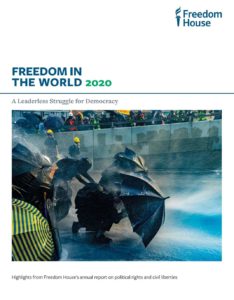
Credit: Open Technology Fund
“Transnational repression” is a term used to describe how countries silence their exiles and diasporas abroad. It encompasses a spectrum of tactics, from assassinations, to renditions, to spyware, to intimidation of exiles’ family members who have stayed behind, says Nate Schenkkan, Director for Special Research at Freedom House, a partner of the National Endowment for Democracy (NED).
As a transnational phenomenon, it is inseparable from broader trends of globalization. States employ the tactics of transnational repression within patterns of international mobility and finance, through legal institutions that regulate migration and citizenship, and via digital technologies that enable instantaneous and constant communication across borders, he writes in an introduction to a new Special Report, Perspectives on “Everyday” Transnational Repression in an Age of Globalization, in which…..
 Marcus Michaelsen explains the importance of digital tools ….. Fiona Adamson and Gerasimos Tsourapas lay out a typology for understanding another widespread form of transnational repression: coercion-by-proxy, or pressure on exiles’ family members, associates, or acquaintances who remain in the origin country. …, Dana Moss elaborates on the effects of transnational repression on the role that exiles and diasporas play in support of democracy and human rights in their origin countries….., Saipira Furstenberg, Tena Prelec, and John Heathershaw widen the discussion by placing transnational repression within the larger framework of authoritarian influence, through an examination of the ways that authoritarian states are able to use higher education as a means to control discourse and dissent beyond their borders.
Marcus Michaelsen explains the importance of digital tools ….. Fiona Adamson and Gerasimos Tsourapas lay out a typology for understanding another widespread form of transnational repression: coercion-by-proxy, or pressure on exiles’ family members, associates, or acquaintances who remain in the origin country. …, Dana Moss elaborates on the effects of transnational repression on the role that exiles and diasporas play in support of democracy and human rights in their origin countries….., Saipira Furstenberg, Tena Prelec, and John Heathershaw widen the discussion by placing transnational repression within the larger framework of authoritarian influence, through an examination of the ways that authoritarian states are able to use higher education as a means to control discourse and dissent beyond their borders.
- Essay 1: The Digital Transnational Repression Toolkit, and Its Silencing Effects
- Essay 2: At Home and Abroad: Coercion-by-Proxy as a Tool of Transnational Repression
- Essay 3: The Importance of Defending Diaspora Activism for Democracy and Human Rights
- Essay 4: The Internationalization of Universities and the Repression of Academic Freedom







